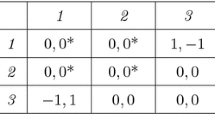Abstract
Consider a market in which two distinct groups of agents face each other. Every agent can improve upon his status quo if he is matched with a member of the opposite group and if he agrees with his partner how to split the realized gain. The paper presents two non-cooperative games in which the agents construct the allocation without the help of an auctioneer. In the first game the set of equilibria coincides with the cooperative “stable solutions” which are well-established in this context. In the second game it is shown that a change of the order of the moves is sufficient to arrive at a unique equilibrium payoff.
Similar content being viewed by others
References
Crawford V, Knoer E (1981) Job Matching with Heterogeneous Firms and Workers. Econometrica, Vol. 49, No. 2, pp. 437–450
Demange G, Gale D (1985) The Strategy Structure of Two-Sided Matching Markets. Econometrica, Vol. 53, No. 4, pp. 873–888
Gale D, Shapley L (1962) College Admissions and the Stability of Marriage. American Mathematical Monthly, Vol. 69, pp. 9–15
Kamecke U (1988a) Modelling Competition in Matching Markets with Non-Cooperative Game Theory. Dissertation, University of Bonn
Kamecke U (1988b) Computing Equilibrium in a Matching Market with a Walrasian Mechanism. Discussion Paper No. A-208, University of Bonn
Kaneko M (1982) The Central Assignment Game and the Assignment Markets. Journal of Mathematical Economics, Vol. 10, No. 2/3, pp. 205–232
Nash J (1950) The Bargaining Problem. Econometrica, Vol. 18, No. 1, pp. 155–162
Nash J (1951) Non-Cooperative Games. Annals of Mathematics, Vol. 54, No. 2, pp. 286–295
Nash J (1953) Two-Person Cooperativ games. Econometrica, Vol. 21, No. 1, pp. 128–140
Rochford S (1984) Symmetrically Pairwise-Bargained Allocations in an Assignment Market. Journal of Economic Theory, Vol. 34, No. 2, pp. 262–281
Roth A (1979) Axiomatic Models of Bargaining. Lecture Notes in Economics and Mathematical Systems, No. 170 Berlin
Roth A (1984a) Stability and Polarization of Interests in Job Matching. Econometrica, Vol. 52, No. 1, pp. 47–57
Roth A (1984b) Misrepresentation and Stability in the Marriage Problem. Journal of Economic Theory, Vol. 34, No. 2, pp. 383–387
Roth A (1985) The College Admission Problem is not Equivalent to the Marriage Problem. Journal of Economic Theory, Vol. 36, No. 2, pp. 277–288
Rubinstein A, Wolinsky A (1985) Equilibrium in a Market with Sequential Bargaining. Econometrica, Vol. 53, No. 5, pp. 1133–1150
Shubik M (1984) A Game-Theoretic Approach to Political Economy. London
Author information
Authors and Affiliations
Rights and permissions
About this article
Cite this article
Kamecke, U. Non-cooperative matching games. Int J Game Theory 18, 423–431 (1989). https://doi.org/10.1007/BF01358802
Received:
Revised:
Issue Date:
DOI: https://doi.org/10.1007/BF01358802




